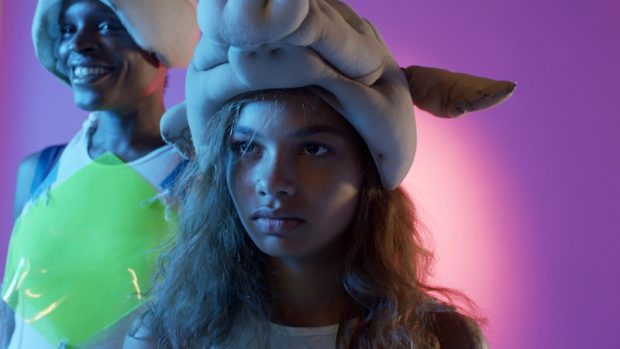 The story of a young woman’s struggle with her overprotective mother, and her fascination with a woman directing her in an experimental theater group, draws parallels between performance, mental illness, and freedom of identity.
The story of a young woman’s struggle with her overprotective mother, and her fascination with a woman directing her in an experimental theater group, draws parallels between performance, mental illness, and freedom of identity.
A work of art can express many things, and one of the most challenging tasks for an artist is to reflect on the making of art itself—in other words, making art about art. Many a film has foundered trying to show what makes a painter tick, or a writer. Creativity is so elusive that it resists being portrayed in dramatic form. Writer-director Josephine Decker has used her background in performance art to solve that problem with a radically subjective style in her new film, Madeline’s Madeline.
The film places us immediately in the point of view of its main character, Madeline, a young member of an experimental theater group, and we only gradually become aware of the relationships and connections in her life. The group uses improvisation to get its performers into the mindset, or the skin, of whatever they’re playing, and this process begins at a basic level with animals—in Madeline’s case a cat, and later, a sea turtle and a pig. The theater director, a charismatic woman named Evangeline, uses these improvisations to piece together an eventual story for the troupe to enact. This process impels the actors into a state of vulnerability and spontaneous, often joyful or humorous, expression, but it also pushes them to their limits. Madeline’s gifts make her stand out from the rest, and Evangeline creates a special bond with her, which results in the young woman becoming essentially the star of the show.
Meanwhile, we learn that Madeline lives with her mother Regina, who is loving but also extremely protective. Although the daughter is attached to her mother, she also resists her and pushes against her worrying and controlling behavior. It’s a tense relationship, and then we also discover that Madeline has an unnamed psychiatric disorder for which she’s taking medication. The theme of mental illness becomes one of the threads woven into this weird fabric, but it would be a mistake to start making assumptions about this.
Now, in describing this basic set-up, I realize that it all sounds very abstract and undefined. But in watching the film, what you get is an intense layering of scenes and impressions that keeps you off balance, emotionally involved with Madeline and her mother and the drama teacher, never knowing what to expect, and this is precisely the effect that Josephine Decker wants her film to have. Just as the experimental theater gropes tentatively toward a sense of what the show will be, so the film evokes that tentative feeling of uncertainty; not even sure of one’s own identity. Who is Madeline? She has so many strong feelings, but she doesn’t know herself yet. And she knows that she doesn’t know.
The movie is built around 20-year-old actress Helena Howard, whom Decker discovered five years ago at a teen arts festival. This is her first film, and her performance as Madeline is riveting. She is extremely forceful and many-sided in her portrayal of someone who is a mystery to herself, and is for most of the film a mystery to us. Two wonderful veteran actresses support her: Miranda July, known more for her own writing and directing than for her rare acting work, is perfection as the mother, Regina, clinging to the daughter while still managing to be achingly sympathetic. And the distinguished Canadian actress Molly Parker is excellent as the theater director and teacher Evangeline, who has an obsessive devotion to the craft that acts like a magic spell on Madeline, who in turn is desperate for someone to support and believe in her.
The title, like everything else in this movie, is unusual—Madeline’s Madeline is about self reflection; it’s an experimental film about experimental theater, an examination of self-examination, and in the end, a young woman’s coming to a sense of herself. The style of Madeline’s Madeline is like nothing else you’ve ever seen. And rather than put you off, I would hope this makes you eager for the adventure.

A meditation on being in the present moment shows a young man on a weekend before going home from Brussels to Romania, poised between...

Steven Spielberg tackles the story of The Washington Post’s decision to print The Pentagon Papers, and the odyssey of courage by its publisher, played...

A street kid fights for survival in Lebanon, in Nadine Labaki’s heart wrenching new film. Nadine Labaki is a Lebanese writer-director whose three feature...